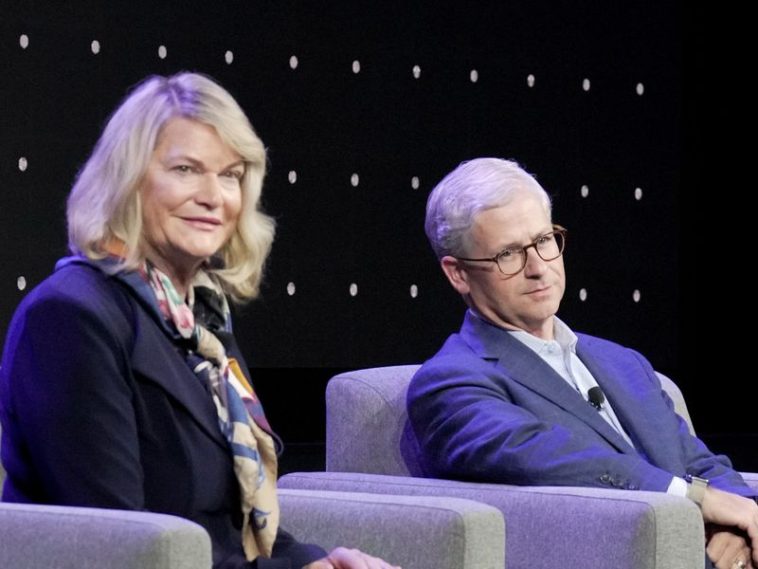Amitoj Singh is CoinDesk’s regulatory reporter covering India. He holds BTC and ETH below CoinDesk’s disclosure threshold of $1,000.
AUSTIN, Texas – The U.S. House Financial Services Committee and House Agriculture Committee will put together legislation to oversee the crypto sector in the “next two months” after holding joint public hearings starting May, said Rep. Patrick McHenry (R–N.C.), chair of the House Financial Services Committee.
When asked whether such a bill could be signed by President Joe Biden in the next 12 months, McHenry told a crowd at CoinDesk’s Consensus 2023 event, “yes.” The key lawmaker was quick to provide a rider that it’s always a challenge to legislate something new into existence.
“What we plan to do over the next two months is report a deal out,” McHenry said, adding that the bill will address both securities and commodities regimes and issues that are hard to fix on either side.
Sen. Cynthia Lummis (R-Wyo.), the other panellist during the session, said she looked forward to coordinating those efforts with McHenry, adding that the House had a better chance than the Senate at getting legislation through earlier. She said if the House moves first on crypto, it would “improve our chances” in the Senate.
“We have tried to keep partisan tinge off this subject,” Lummis said. “This is a bipartisan subject we need to address before the 2024 election.”
The U.S. Congress has so far been unable to get comprehensive legislation on crypto passed despite a number of bills making progress on Capitol Hill last year.
But this month Republicans on the House Financial Services Committee took a swing at finding bipartisanship support for a second effort at stablecoin legislation, though bipartisan support remains uncertain. Republicans introduced a discussion draft which may mark a new starting point for negotiations with Democrats.
Lummis, who has been dubbed the Senate’s “Crypto Queen,” had introduced the bipartisan “Responsible Financial Innovation Act,” aimed at creating a regulatory framework for the industry last year with Sen. Kirsten Gillibrand (D-N.Y.).
Lummis told the crowd at Consensus that a new-and-improved version of the bill will be unveiled in six to eight weeks.
“We are probably going to have a stronger section on national security. You will see a stronger cybercrime aspect to our bill,” Lummis said.
A bipartisan bill introduced in both the U.S. Senate and House of Representatives on Thursday calls for the federal government to study crypto use cases for illegal activity, including studying how terrorists or other criminals might use cryptocurrencies.
Last week, McHenry’s committee grilled U.S. Securities and Exchange Commission (SEC) Chair Gary Gensler over his refusal to say whether ether (ETH), the second-largest cryptocurrency by market cap, was a security.
“Congress needs to provide sufficient guidance there,” said Lummis. “I anticipate we will still be using the Howey Test” in the most modern way expressed by U.S. courts.
While the deadlock in Congress between Republicans and Democrats continues, lawmakers have been facing increasing pressure to legislate the industry after the meltdown of the FTX crypto exchange and the more recent collapse in crypto banking.
McHenry also said that crypto’s recent role in the U.S. banking crisis, which has left the industry’s banking relationships strained, is fair to call “Operation Choke Point 2.0.”
“We have to fix this problem, we have to provide certainty that you can bank in a safe and sound manner,” he said. “This is a great example of why Congress must legislate and provide clarity.”
Meanwhile, jurisdictions such as the European Union have approved the Markets in Crypto Assets (MiCA) law, making it the first major jurisdiction in the world to introduce a comprehensive crypto law. The EU’s agreement puts the bloc in the lead on Web3 technology, McHenry told CoinDesk earlier.
“Several jurisdictions are ahead of us,” Lummis said, mentioning MiCA and other efforts. “We are falling way behind. These countries are telling us to catch up.”
Regulators in Japan and the United Arab Emirates have also moved toward regulating the space while Hong Kong and the UK are revisiting how they approach crypto.
UPDATE (April 28, 2023, 22:49 UTC): Adds comments from McHenry and Lummis on banking and international competition.
Edited by Jesse Hamilton.
DISCLOSURE
Please note that our
and
do not sell my personal information
has been updated
.
The leader in news and information on cryptocurrency, digital assets and the future of money, CoinDesk is a media outlet that strives for the highest journalistic standards and abides by a
strict set of editorial policies.
CoinDesk is an independent operating subsidiary of
which invests in
and blockchain
As part of their compensation, certain CoinDesk employees, including editorial employees, may receive exposure to DCG equity in the form of
which vest over a multi-year period. CoinDesk journalists are not allowed to purchase stock outright in DCG
.
Amitoj Singh is CoinDesk’s regulatory reporter covering India. He holds BTC and ETH below CoinDesk’s disclosure threshold of $1,000.
Learn more about Consensus 2023, CoinDesk’s longest-running and most influential event that brings together all sides of crypto, blockchain and Web3. Head to consensus.coindesk.com to register and buy your pass now.
https://www.coindesk.com/policy/2023/04/28/us-house-will-have-crypto-bill-in-2-months-mchenry/?utm_medium=referral&utm_source=rss&utm_campaign=headlines



:format(jpg)/www.coindesk.com/resizer/2T8HrOlILUCuZc0Nt5fqKxPPy6E=/arc-photo-coindesk/arc2-prod/public/LW4HUR2U7BC5RFC4XSV6HGCP4E.png)


 BTC-USD
BTC-USD  ETH-USD
ETH-USD  LTC-USD
LTC-USD  XRP-USD
XRP-USD